Joachim Gauck
Joachim Gauck
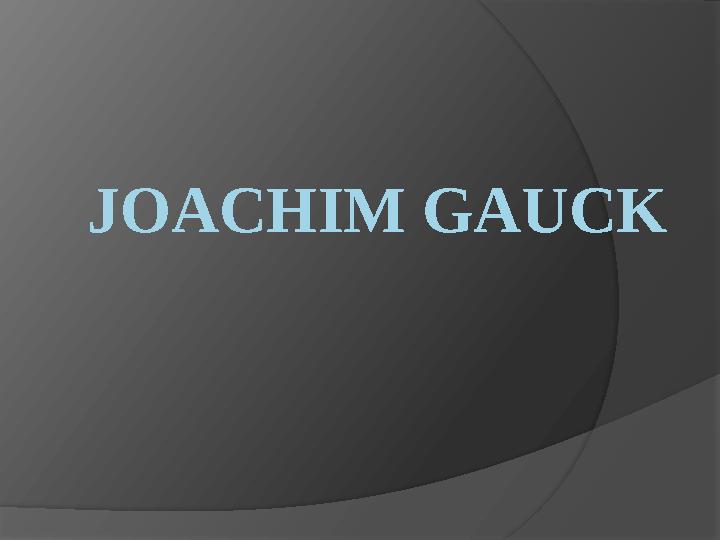

#1 слайд
JOACHIM GAUCK
1 слайд
JOACHIM GAUCK
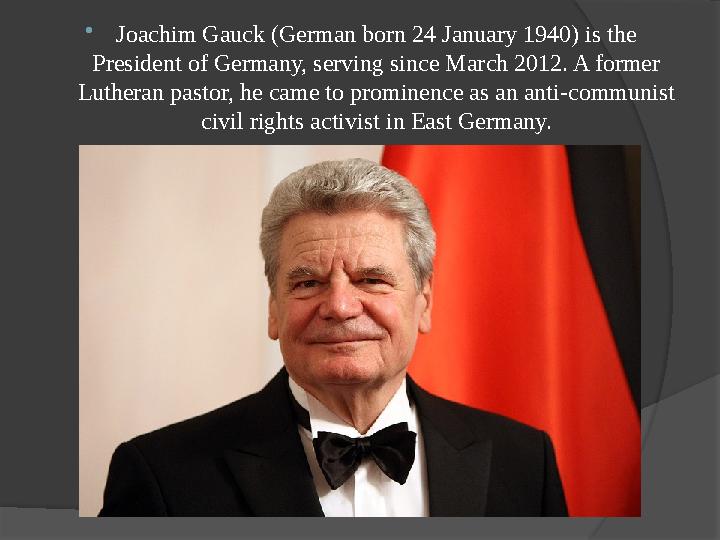
#2 слайд
Joachim Gauck (German born 24 January 1940) is the
President of Germany, serving since March 2012. A former
Lutheran pastor, he came to prominence as an anti-communist
civil rights activist in East Germany.
2 слайд
Joachim Gauck (German born 24 January 1940) is the President of Germany, serving since March 2012. A former Lutheran pastor, he came to prominence as an anti-communist civil rights activist in East Germany.
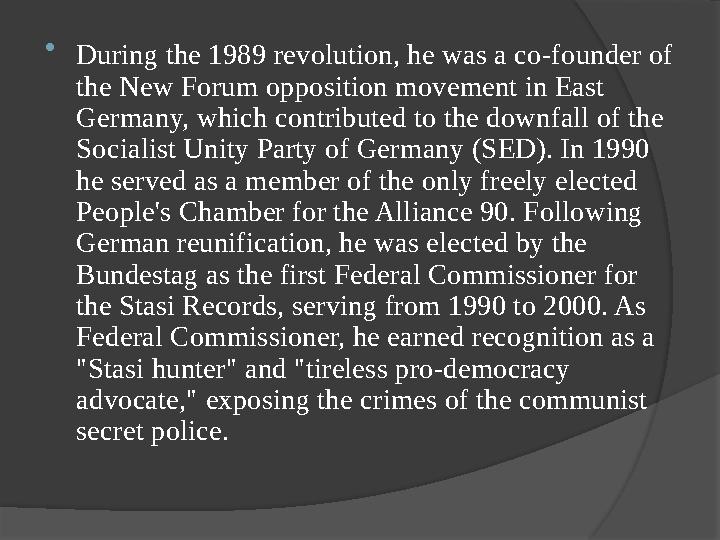
#3 слайд
During the 1989 revolution, he was a co-founder of
the New Forum opposition movement in East
Germany, which contributed to the downfall of the
Socialist Unity Party of Germany (SED). In 1990
he served as a member of the only freely elected
People's Chamber for the Alliance 90. Following
German reunification, he was elected by the
Bundestag as the first Federal Commissioner for
the Stasi Records, serving from 1990 to 2000. As
Federal Commissioner, he earned recognition as a
"Stasi hunter" and "tireless pro-democracy
advocate," exposing the crimes of the communist
secret police.
3 слайд
During the 1989 revolution, he was a co-founder of the New Forum opposition movement in East Germany, which contributed to the downfall of the Socialist Unity Party of Germany (SED). In 1990 he served as a member of the only freely elected People's Chamber for the Alliance 90. Following German reunification, he was elected by the Bundestag as the first Federal Commissioner for the Stasi Records, serving from 1990 to 2000. As Federal Commissioner, he earned recognition as a "Stasi hunter" and "tireless pro-democracy advocate," exposing the crimes of the communist secret police.
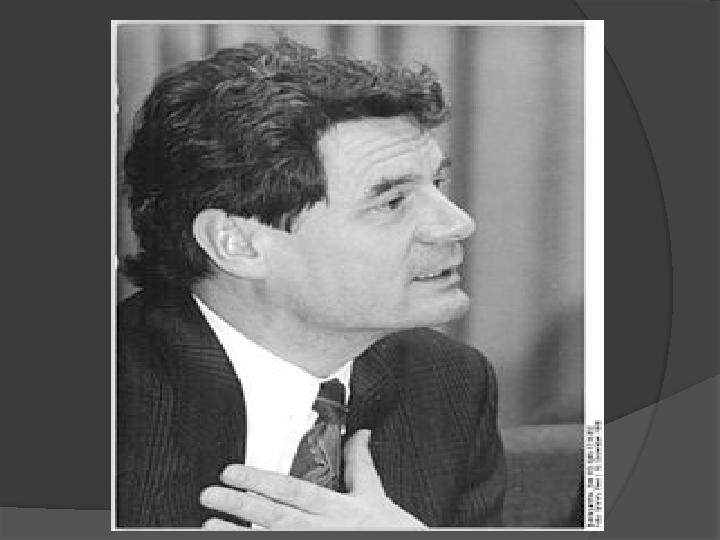
#4 слайд
4 слайд
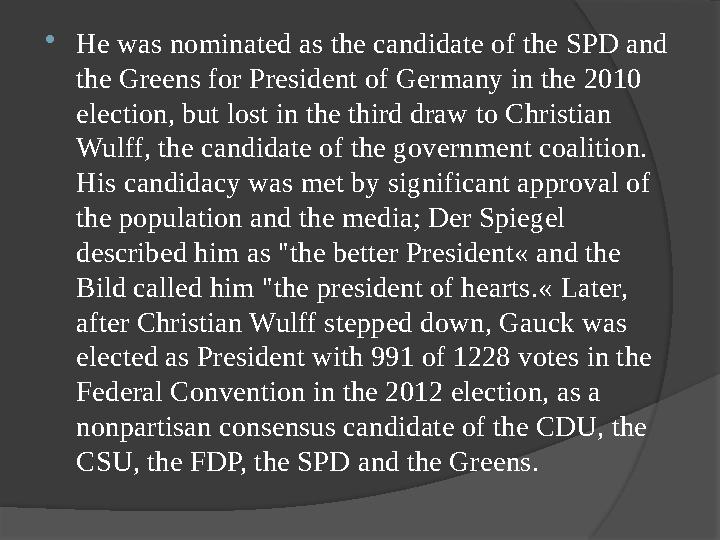
#5 слайд
He was nominated as the candidate of the SPD and
the Greens for President of Germany in the 2010
election, but lost in the third draw to Christian
Wulff, the candidate of the government coalition.
His candidacy was met by significant approval of
the population and the media; Der Spiegel
described him as "the better President« and the
Bild called him "the president of hearts.« Later,
after Christian Wulff stepped down, Gauck was
elected as President with 991 of 1228 votes in the
Federal Convention in the 2012 election, as a
nonpartisan consensus candidate of the CDU, the
CSU, the FDP, the SPD and the Greens.
5 слайд
He was nominated as the candidate of the SPD and the Greens for President of Germany in the 2010 election, but lost in the third draw to Christian Wulff, the candidate of the government coalition. His candidacy was met by significant approval of the population and the media; Der Spiegel described him as "the better President« and the Bild called him "the president of hearts.« Later, after Christian Wulff stepped down, Gauck was elected as President with 991 of 1228 votes in the Federal Convention in the 2012 election, as a nonpartisan consensus candidate of the CDU, the CSU, the FDP, the SPD and the Greens.
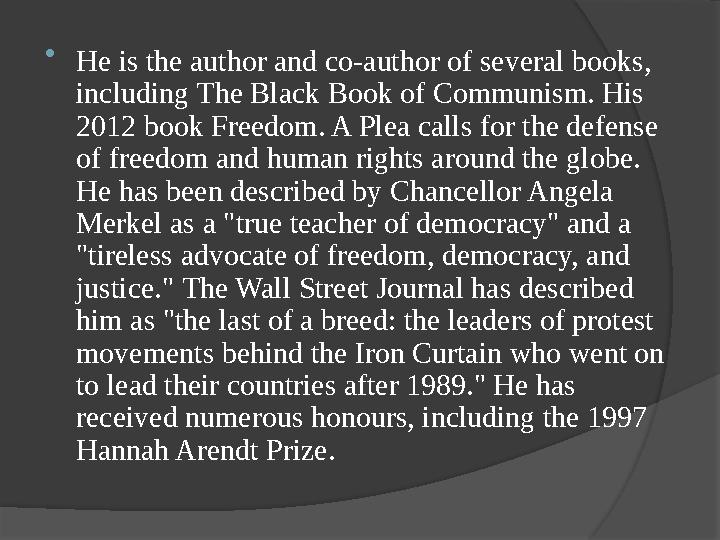
#6 слайд
He is the author and co-author of several books,
including The Black Book of Communism. His
2012 book Freedom. A Plea calls for the defense
of freedom and human rights around the globe.
He has been described by Chancellor Angela
Merkel as a "true teacher of democracy" and a
"tireless advocate of freedom, democracy, and
justice." The Wall Street Journal has described
him as "the last of a breed: the leaders of protest
movements behind the Iron Curtain who went on
to lead their countries after 1989." He has
received numerous honours, including the 1997
Hannah Arendt Prize.
6 слайд
He is the author and co-author of several books, including The Black Book of Communism. His 2012 book Freedom. A Plea calls for the defense of freedom and human rights around the globe. He has been described by Chancellor Angela Merkel as a "true teacher of democracy" and a "tireless advocate of freedom, democracy, and justice." The Wall Street Journal has described him as "the last of a breed: the leaders of protest movements behind the Iron Curtain who went on to lead their countries after 1989." He has received numerous honours, including the 1997 Hannah Arendt Prize.
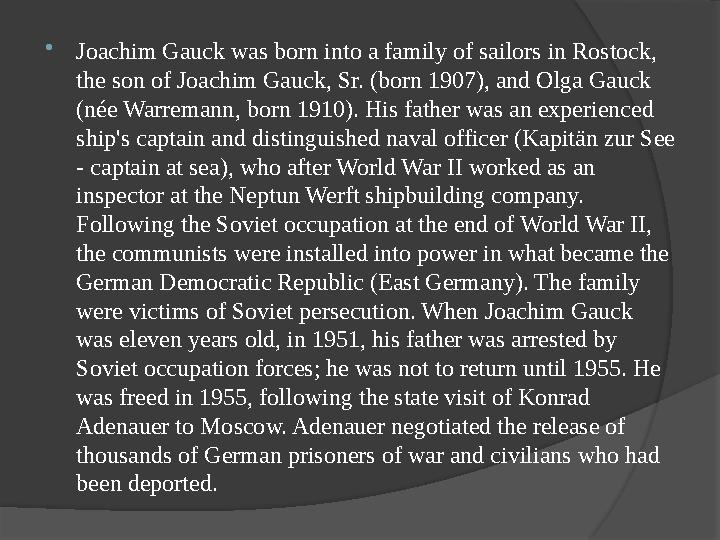
#7 слайд
Joachim Gauck was born into a family of sailors in Rostock,
the son of Joachim Gauck, Sr. (born 1907), and Olga Gauck
(née Warremann, born 1910). His father was an experienced
ship's captain and distinguished naval officer (Kapitän zur See
- captain at sea), who after World War II worked as an
inspector at the Neptun Werft shipbuilding company.
Following the Soviet occupation at the end of World War II,
the communists were installed into power in what became the
German Democratic Republic (East Germany). The family
were victims of Soviet persecution. When Joachim Gauck
was eleven years old, in 1951, his father was arrested by
Soviet occupation forces; he was not to return until 1955. He
was freed in 1955, following the state visit of Konrad
Adenauer to Moscow. Adenauer negotiated the release of
thousands of German prisoners of war and civilians who had
been deported.
7 слайд
Joachim Gauck was born into a family of sailors in Rostock, the son of Joachim Gauck, Sr. (born 1907), and Olga Gauck (née Warremann, born 1910). His father was an experienced ship's captain and distinguished naval officer (Kapitän zur See - captain at sea), who after World War II worked as an inspector at the Neptun Werft shipbuilding company. Following the Soviet occupation at the end of World War II, the communists were installed into power in what became the German Democratic Republic (East Germany). The family were victims of Soviet persecution. When Joachim Gauck was eleven years old, in 1951, his father was arrested by Soviet occupation forces; he was not to return until 1955. He was freed in 1955, following the state visit of Konrad Adenauer to Moscow. Adenauer negotiated the release of thousands of German prisoners of war and civilians who had been deported.
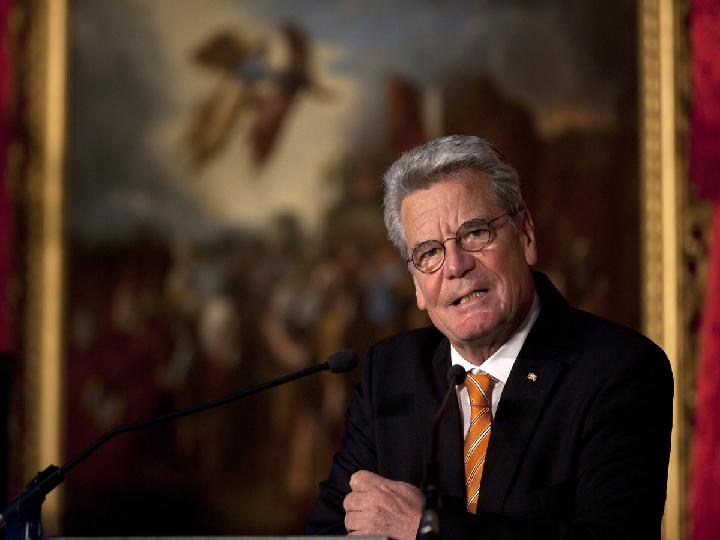
#8 слайд
8 слайд
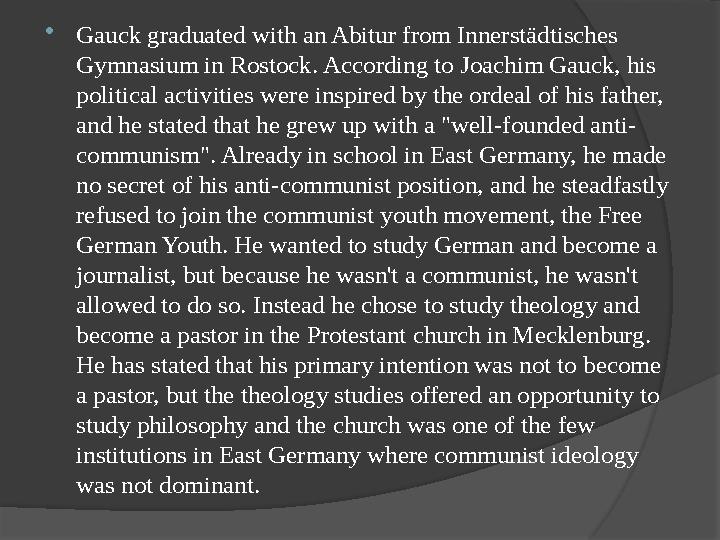
#9 слайд
Gauck graduated with an Abitur from Innerstädtisches
Gymnasium in Rostock. According to Joachim Gauck, his
political activities were inspired by the ordeal of his father,
and he stated that he grew up with a "well-founded anti-
communism". Already in school in East Germany, he made
no secret of his anti-communist position, and he steadfastly
refused to join the communist youth movement, the Free
German Youth. He wanted to study German and become a
journalist, but because he wasn't a communist, he wasn't
allowed to do so. Instead he chose to study theology and
become a pastor in the Protestant church in Mecklenburg.
He has stated that his primary intention was not to become
a pastor, but the theology studies offered an opportunity to
study philosophy and the church was one of the few
institutions in East Germany where communist ideology
was not dominant.
9 слайд
Gauck graduated with an Abitur from Innerstädtisches Gymnasium in Rostock. According to Joachim Gauck, his political activities were inspired by the ordeal of his father, and he stated that he grew up with a "well-founded anti- communism". Already in school in East Germany, he made no secret of his anti-communist position, and he steadfastly refused to join the communist youth movement, the Free German Youth. He wanted to study German and become a journalist, but because he wasn't a communist, he wasn't allowed to do so. Instead he chose to study theology and become a pastor in the Protestant church in Mecklenburg. He has stated that his primary intention was not to become a pastor, but the theology studies offered an opportunity to study philosophy and the church was one of the few institutions in East Germany where communist ideology was not dominant.

шағым қалдыра аласыз
















